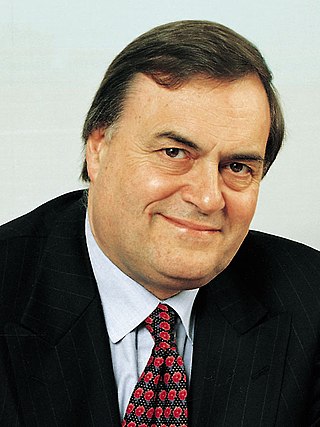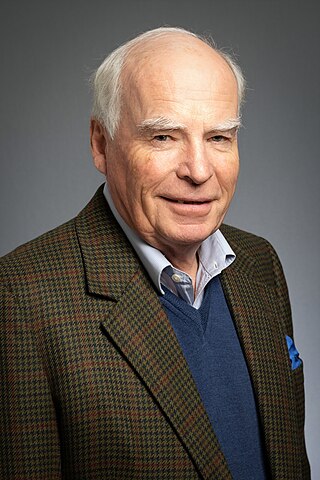Related Research Articles
Railtrack was a group of companies that owned the track, signalling, tunnels, bridges, level crossings and all but a handful of the stations of the British railway system from 1994 until 2002. It was created as part of the privatisation of British Rail, listed on the London Stock Exchange, and was a constituent of the FTSE 100 Index. In 2002, after experiencing major financial difficulty, most of Railtrack's operations were transferred to the state-controlled non-profit company Network Rail. The remainder of Railtrack was renamed RT Group plc and eventually dissolved on 22 June 2010.

John Leslie Prescott, Baron Prescott is a British politician who served as Deputy Prime Minister of the United Kingdom from 1997 to 2007 and as First Secretary of State from 2001 to 2007. A member of the Labour Party, he was Member of Parliament (MP) for Kingston upon Hull East for 40 years, from 1970 to 2010. He was seen as the political link to the working class in a Labour Party increasingly led by modernising, middle-class professionals such as Tony Blair and Peter Mandelson and developed a reputation as a key conciliator in the often stormy relationship between Blair and Gordon Brown.

Richard Thomas James Wilson, Baron Wilson of Dinton, is a crossbench member of the British House of Lords and former Cabinet Secretary.

The Railways Act 1993 was introduced by John Major's Conservative government and passed on 5 November 1993. It provided for the restructuring of the British Railways Board (BRB), the public corporation that owned and operated the national railway system. A few residual responsibilities of the BRB remained with BRB (Residuary) Ltd.
The privatisation of British Rail was the process by which ownership and operation of the railways of Great Britain passed from government control into private hands. Begun in 1994, the process was largely completed by 1997. The deregulation of the industry was in part motivated by the enactment of EU Directive 91/440 in 1991, which aimed to create a more efficient railway network by creating greater competition.

The Strategic Rail Authority (SRA) was a non-departmental public body in the United Kingdom set up under the Transport Act 2000 to provide strategic direction for the railway industry. Its motto was 'Britain's railway, properly delivered'. It was abolished by the Railways Order 2006, its functions being absorbed by the Department for Transport or the Office of Rail Regulation.

Sir Robert Alastair Newton Morton was Chief Executive of Eurotunnel and Chairman of the Strategic Rail Authority, industrialist and the last chairman of the British Railways Board.

The Office of Rail and Road (ORR) is a non-ministerial government department responsible for the economic and safety regulation of Britain's railways, and the economic monitoring of National Highways.

The Office of Gas and Electricity Markets (Ofgem), supporting the Gas and Electricity Markets Authority (GEMA), is the government regulator for the electricity and downstream natural gas markets in Great Britain. It was formed by the merger of the Office of Electricity Regulation (OFFER) and Office of Gas Supply (Ofgas).

Gerald Michael Nolan Corbett DL is a businessman who was the chairman of the Marylebone Cricket Club (MCC). A businessman, over a long career he has been a director of thirteen public companies, seven of which he has chaired. He is currently chairman of Segro plc, the FTSE 100 international industrial property logistics group. He chaired Britvic plc for 12 years until September 2017. Britvic plc is the international soft drink company whose brands include Robinsons squash, J2O, Tango, Fruit Shoot, Ballygowan water and is also a bottler for PepsiCo. As chairman he led the flotation of Britvic in 2005. He was chairman of Betfair plc between 2012 and 2016 when Betfair merged with Paddy Power plc to create Paddy Power Betfair.

Norman Roy Blackwell, Baron Blackwell is a British former businessman, public servant, Conservative politician, campaigner and policy advisor.
Sir Thomas Philip Winsor is a British arbitrator and mediator, lawyer, consultant and economic regulatory professional.
The Rail Regulator was a statutory office holder, created with effect from 1 December 1993 by section 1 of the Railways Act 1993, for the independent economic regulation of the British railway industry. The Rail Regulator was in charge of an executive agency called the Office of the Rail Regulator.
John Swift KC is an English barrister and a leading authority on competition law. Born on 11 July 1940, he was called to the English bar in 1965 and took silk in 1981. He became a Bencher of the Inner Temple in 1992.
The Director of Passenger Rail Franchising was a statutory office holder in the United Kingdom created in 1993 by the Railways Act 1993 and usually called the Franchising Director. The role lasted from 5 November 1993 until 31 January 2001. The Franchising Director was in charge of an executive agency called the Office of Passenger Rail Franchising (OPRAF). It was superseded by the Strategic Rail Authority.
The Honourable Anna Elizabeth Blackstock Walker CB is a British senior civil servant and regulator of services. Walker is married to Timothy Walker, with whom she has three adult children. She is the daughter of Lord Butterworth.

Sir Robert William Roy McNulty, CBE is a Northern Irish-born businessman.

The Electricity Act 1989 provided for the privatisation of the electricity supply industry in Great Britain, by replacing the Central Electricity Generating Board in England and Wales and by restructuring the South of Scotland Electricity Board and the North of Scotland Hydro-Electric Board. The Act also established a licensing regime and a regulator for the industry called the Office of Electricity Regulation (OFFER), which has since become the Office of Gas and Electricity Markets (OFGEM).

The Gas Act 1986 created the framework for privatisation of the gas supply industry in Great Britain. This legislation would be replacing the British Gas Corporation with British Gas plc. The Act also established a licensing regime, a Gas Consumers’ Council, and a regulator for the industry called the Office of Gas Supply (OFGAS).

Sir Malcolm Rowland Bates was a British industrialist. He served as the chairman of London Regional Transport from 1999 to 2003.
References
- ↑ Anna Walker announced as ORR Chairman designate. Retrieved on 2012-11-22.
- 1 2 Appointment of Chairman of the Guernsey Competition and Regulation Authority, Committee for Economic Development, Guernsey, 2020
- ↑ "No. 59282". The London Gazette (Supplement). 31 December 2009. p. 2.